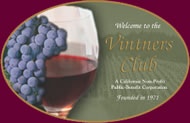 |
|
TASTINGS are held once a month and last a little less than two hours. 10 wines are tasted in blind-conditions (meaning that participants know the varietal, but do not know which wine is in which glass until the results of the tasting are announced). POST-TASTING DINNERS: Recognizing that wine is made for enjoyment with food and friends, the tastings are followed by a dinner at which the tasted varietal is paired with food. These dinners are designed to advance participants' knowledge of the tasted wines and to add to the camaraderie. CANCELLATION POLICY: Tastings and events routinely sell out quickly. Waiting lists are common due to limitations of seating space and stemware. Cancellation deadlines are generally one week prior to the tasting. This facilitates proper preparation--- sufficient quantities of wines, sufficient German crystal stemware, sufficient numbers of tables, sufficiently large tasting room, etc. --- and helps to avoid unnecessary expenditures. It also facilitates the efforts of our generous volunteers. Should an unforeseen circumstance present itself after the cancellation deadline has passed, you may send a substitute, provided that you e-mail the Vintners Club with the name and contact information of your substitute at least one business day prior to the tasting. We regret that we are not able to include any member or guest who has not made an advance reservation. OUTREACH PROGRAM: So as to further wine education as a public benefit, and with the goal of educating young consumers, a limited number of scholarships are offered to full-time students over age 21. Students at Stanford University, University of California at San Francisco, the California Culinary Academy, University of California at Davis, University of California at Berkeley, University of Southern California, Sonoma State University and University of San Francisco have availed themselves of these opportunities. HIGH-END WINE EDUCATION DINNERS are organized from time to time at restaurants in the San Francisco Bay Area and at Members' homes. Often, the wines for these dinners come from our Members who have extensive private wine collections. The Club strives to introduce Members to American and foreign wines with which they may not have much familiarity. Appropriate pairing of the wines with food is an important component of these educational events. FIELD TRIPS: Periodically, Members enhance their knowledge through trips to various viticultural areas in California and Europe where they are hosted by member-wineries. Visits to the vineyards and tastings of library wines are part and parcel of these invaluable educational experiences. A few years ago, Members were treated to a magnificent two-day gala at Château Brane-Cantenac (classified as Second Growth in 1855), commune of Margaux, in Bordeaux (France). As guests of the chateau, Members had the privilege of experiencing scores of rare and exceptional wines, including old vintages of grands vins from the topmost Classified Growth châteaux, and a Methuselah (6-litre bottle) of the 1986 grand vin of Château Brane-Cantenac, all in the company of Bordeaux’ foremost château owners and winemakers.THE PANEL: Tastings are open to Members and their guests who reserve a seat. The panel of men and women varies from tasting to tasting and the level of expertise ranges from professional to enthusiastic consumers. All are encouraged to attend and learn, regardless of their level of experience. RANKING THE WINES: The final ranking of the wines from first place to tenth place is based on the panel's overall impressions. The rankings of all the panelists are tabulated, and a wine receiving the lowest overall total of rankings is declared the first-place wine (a low overall total indicates the wine was first-, second- or third-place choice of many tasters, while a high overall total indicates the wine received many tenth- through twelfth-place votes). The U.C. Davis 20-Point Scale can also be utilized as an additional aid in ranking the wines. |
36 Southridge West, Tiburon, CA 94920
Telephone: (415) 381-4467
vintnersclub1971@gmail.com
Web Design & Development Donated by
DomainMinds.com, LLC